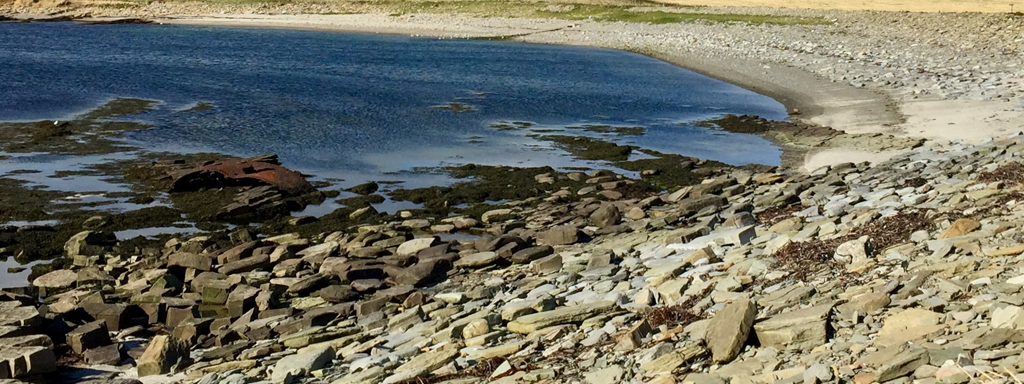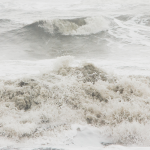If you want to speak to the selkie folk, you must shed seven tears into the sea.
It’s harder than he thought, to shed seven tears, and let them fall, like drops of glass, into the silver rush of water. The tears roll down and tangle in his beard, sting salt on his lips. He can’t make them fall the right way, into the sizzle of foam that laps at his boots.
So he stands in the opalescent light; stares out at the uneasy waves. The wind in his head like a whisper, as it has been all his life.
He comes down here every day, at the turning of the tide. He needs to imagine what it must be like to be in the sea; to twist, to flex, to push your weight against the element of water and have it resist. He thinks he would like that. Air is too thin. You can’t propel yourself by pushing it aside, as you can water. How sweet to immerse in it, to feel the firm stroke of the Atlantic current turning you. To descend in a scatter of diamond bubbles. It would be quick. Like so many fishermen, he never learned to swim.
Was it like that for her? Did she give herself willingly to its clammy caress? Or did she resist? Was there any kind of struggle, in the end? Did she think of him with any kind of regret, as her lungs gasped and her eyes blurred?
The sea sings, but not with words. It sighs, it soughs. A potassium hiss. The sea has its flavours. Sometimes decaying vegetation smells sweet. Sometimes the tang of fish.
He remembers the day he chose her. How he watched her, when she didn’t know he was there. How he knew what to do. He went from house to house, bidding the folk to the wedding. It must be in the waxing of the moon. It must be on the fourth day of the week.
The preparations, as for every wedding. The brewing of ale. The slaughter of sheep. The baking of bread. A bride-bed set up in the chamber. Long tables and benches put up. The clay floor of the barn swept. The copper borrowed for the wedding broth.
The piper led the procession to the church, his wailing whipped away, the ribbons flying. A glossy one twisted, like a strand of sea-wrack, in her hair. Behind them came the girls in their foam-white dresses. Up to the kirk for the stark ritual; then down for the real wedding, for the feast and drink and music.
An old woman tossed the bride-cake from her apron, over the ribboned heads outside the door. Shrieking, the girls scrabbled for it, and the ring hidden in it, which always foretells the next wedding. Then the feast, in the fire-house. He worked the hardest, handing the bread, bringing the bowls, filling the ale-cogs. They praised his diligence: a fine son, his drowned father would be proud of him.
And then the reeling in the barn. A lunatic fiddle scratching and keening. Over and under the arms rolling, like waves in a storm. Feet kicking up dust. The pockets of the women flying out on their strings.
The women whispered. They must burn the hair ribbon. A secret ritual; they never tell the men what is foretold. He knows they place it on a hot stone in the fireplace, and watch it burn. The shapes it takes, as it blackens and curls, foretell her fate. What did they see?
They were dancing the last reel, the ring dance, as he raised the latch of the chamber. And there she was, in the bride bed, lit by the glow of a lamp hung from the beams. Her skin whiter and more translucent than other girls’. Her hair like tangled weed. She was cool and smooth. She tasted of the sea, of salt and bitter kelp.
Now he strides along the shore, kicking at black stones.
They had been married a month when she left. Time enough for the moon to grow fat, and wane again, and the new moon to smile secretly over the sea. She must have stood in the doorway to smell the wind. She must have heard something beyond the range of human hearing. She remembered that he had something hidden somewhere, and she would ransack the house to find it.
He knew something was wrong as he approached the house. No smoke from the oat-thatched chimney. The door was hanging on its hinges. He called her name. The fire-house was empty; the hearth was cold. He ran to the chamber, the barn. The stored straw was ripped out and scattered. He saw where a stool was kicked over. He righted it and stood aloft and reached into the roof-beams. The seal-skin was gone.
He ran to the beach.
He could see the prints of her bare feet in the wet sand. They led to the water’s edge and did not come back.
He thinks of her white skin. Her ocean smell. The smoothness of her, the plump streamlined flanks. Her intelligent eyes. The soft wet pelt of her.
The selkie women, when they take on human form, are always fair. On summer days they take off their seal-skins and lie on the rocks, in the iridescent air.
He should have known she would not stay. He should have known it when he snatched her smooth grey seal-skin from the rock where she was basking. And ran with it, up the shore, so that she had to follow, ungainly, gasping, begging. Her white naked feet on the stones. She battered the hard door of his house, wailed to him, to let her in, to return what he had stolen. He hid the seal-skin in the roof-beams.
He thought once she loved him she would stop wanting to go back to the sea.
…
Biography
Rose New masquerades by day as an English teacher in a girls’ boarding school, but definitely has ancestors who were selkies.
Image: unsplash.com





